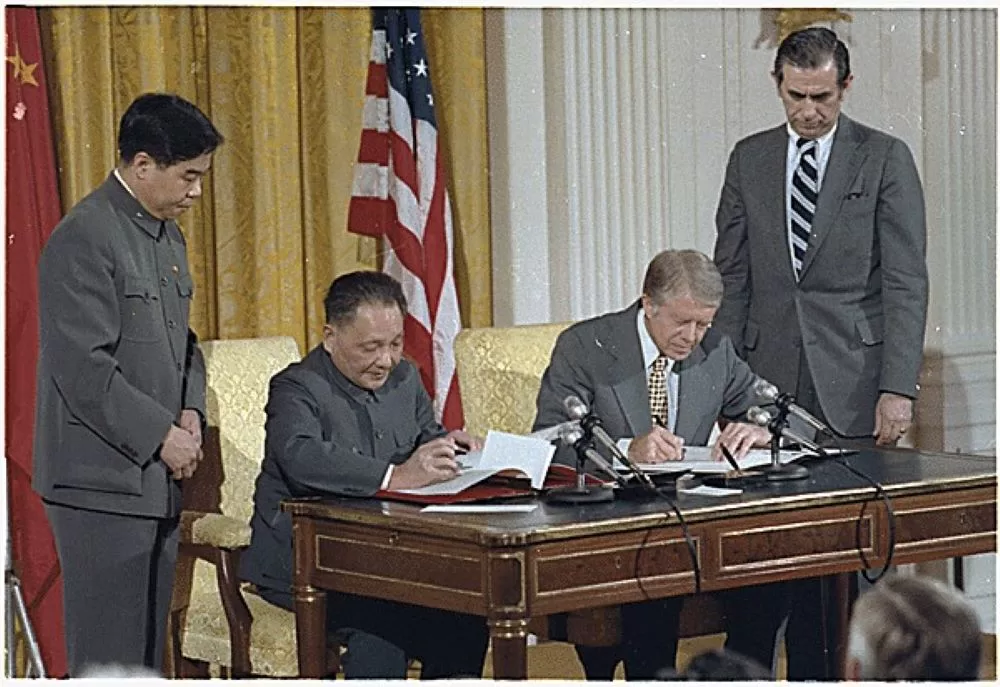
NEW YORK (WSH) — Jimmy Carter, the 39th president of the United States and a Nobel Peace Prize laureate, passed away on December 29, 2024, at the age of 100.
He died at his home in Plains, Georgia, surrounded by his family. The Carter Center confirmed his death in a public statement. His passing comes 13 months after the death of his wife of 77 years, Rosalynn Carter, at the age of 96.
Tributes from Leaders
President Joe Biden hailed Carter as “a model of what it means to live a life of meaning and purpose,” calling him a “dear friend.” Former President Donald Trump expressed gratitude for Carter’s contributions, stating that Americans owe him “a debt of gratitude.” Preparations are underway for a state funeral to honor his legacy.
A Life of Service and Leadership
Early Life and Path to Politics
Born on October 1, 1924, in Plains, Georgia, James Earl Carter Jr. was raised in a farming family. After graduating from the U.S. Naval Academy, he served as a lieutenant in the Navy. Following his father’s death in 1953, Carter returned to Georgia to manage the family’s peanut farm.
His political career began in Georgia’s state legislature, where he served two terms before becoming governor in 1971. As governor, Carter was a progressive voice in the South, advocating for racial integration and civil rights. His famous declaration, “The time for racial discrimination is over,” marked a new chapter for Georgia and the broader South.
Rise to the Presidency
In 1974, with little national name recognition, Carter announced his candidacy for the presidency. Despite being considered an underdog, his grassroots approach and ability to connect with voters propelled him to victory in both the Iowa caucuses and New Hampshire primary. He went on to defeat incumbent Gerald Ford in the 1976 election, becoming the first U.S. president from the Deep South since the Civil War.
Carter’s presidency (1977–1981) was marked by significant achievements, including the Camp David Accords, which facilitated peace between Egypt and Israel, and his commitment to human rights. However, his term was also challenged by economic inflation, energy crises, and the Iran hostage situation, which ultimately contributed to his defeat in the 1980 election by Ronald Reagan.
Champion of Global Peace and Humanitarian Efforts
A Legacy of Peace
Despite his single term in office, Carter’s influence extended far beyond his presidency. His role in mediating the Camp David Accords earned him international acclaim and set the stage for his post-presidential focus on peacebuilding. In 2002, Carter was awarded the Nobel Peace Prize for his decades of work promoting democracy, human rights, and conflict resolution.
The Carter Center
In 1982, Carter founded the Carter Center, which became a beacon for humanitarian efforts worldwide. From eradicating diseases like Guinea worm to monitoring elections in emerging democracies, the Center reflected Carter’s lifelong commitment to global health and human rights.
Carter’s Historic Role in U.S.-China Relations
One of Carter’s most enduring legacies was his role in normalizing diplomatic relations between the United States and China. On January 1, 1979, Carter and Chinese leader Deng Xiaoping announced the establishment of official ties, marking a turning point in global geopolitics. This bold move not only redefined U.S.-China relations but also opened the door for decades of economic and cultural exchange. Carter’s vision and leadership in bridging this divide continue to shape the global landscape today.
A Family Legacy and Historic Partnership
Rosalynn Carter: A Partner in Advocacy
Rosalynn Carter, his wife of 77 years, was a steadfast partner in both public and private life. Known for her advocacy for mental health and humanitarian work, Rosalynn left her own indelible mark on American society. Together, the Carters were the longest-married presidential couple in U.S. history, embodying a partnership built on mutual respect and shared purpose.
The Carter Family
Carter is survived by his four children—Jack, Chip, Jeff, and Amy—along with numerous grandchildren and great-grandchildren. His family described him as a man of faith, humility, and unwavering dedication to service.
Carter’s Enduring Impact
Final Years
In February 2023, Carter entered hospice care after a series of hospitalizations. Despite his declining health, he remained a symbol of resilience and faith. His grandson, Jason Carter, described this period as “a meaningful time of reflection and blessing” for the family.

A Life Remembered
Jimmy Carter lived longer than any other U.S. president and left a legacy unparalleled in modern history. From the peanut fields of Georgia to the corridors of power in Washington, Carter’s journey exemplified humility, integrity, and dedication to a greater good.
As the world bids farewell to this extraordinary leader, his life serves as a reminder that true greatness lies not in power but in the relentless pursuit of peace, equality, and justice.




Rattling clean web site, thankyou for this post.